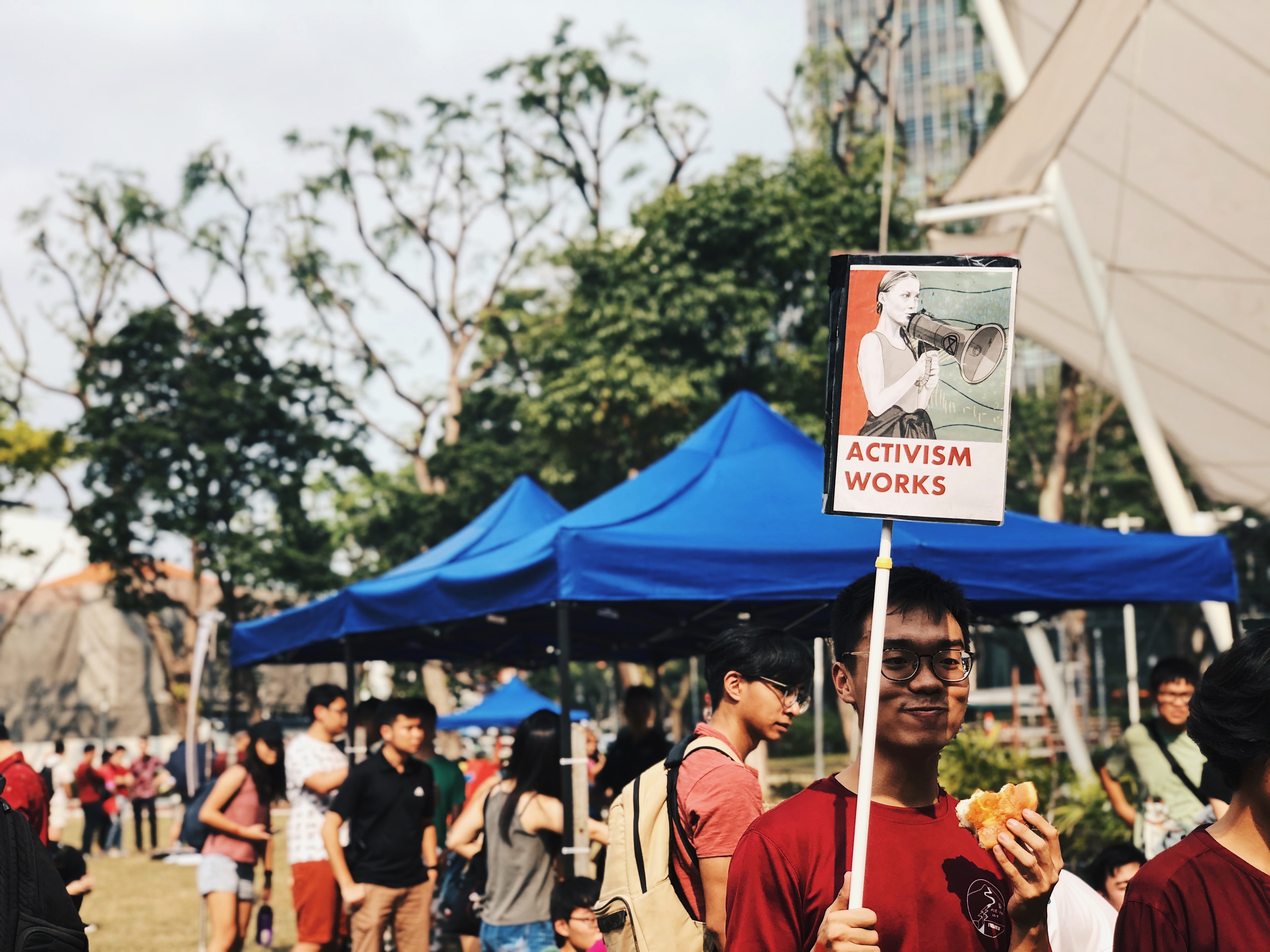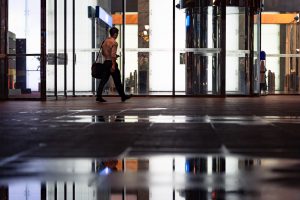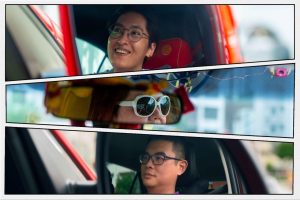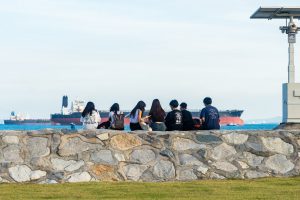The group laughed, but Mingfang, another participant, questioned if this seemingly gendered aspect of sustainability is an obstacle to encouraging more Singaporeans to care for the environment. When asked to elaborate, she said that:
“Ageism and gender are tied into the role of the auntie,” Mingfang explained. “The idea of an old auntie bringing a trolley to the market … it ties environmentalism to the domestic sphere, which limits its appeal to men.”
As a result, men—like Viknesh’s “guy friends”—may not want to be associated with a cause that they perceive as “feminine”.
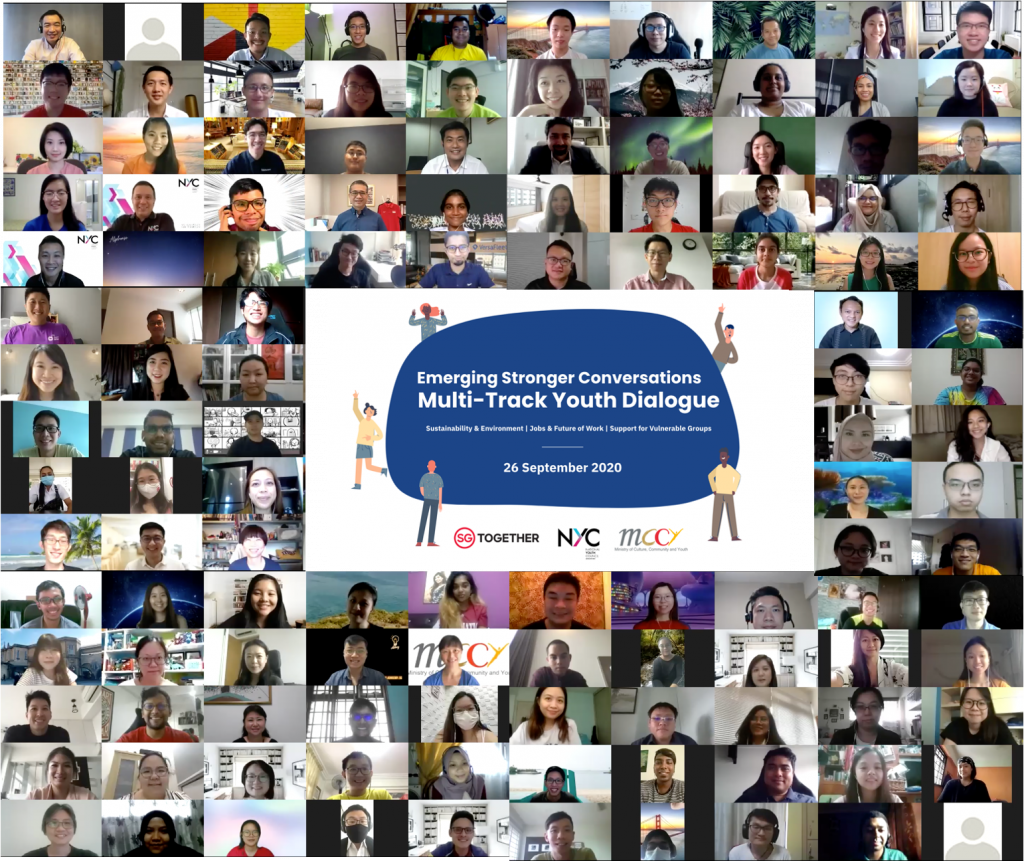
Such insights punctuated the lively discussion held on 26th September, as part of the Singapore Together Emerging Stronger Conversations (ESC). Organised by the National Youth Council (NYC) in response to the changes and challenges Covid-19 has presented, the youth dialogue brought together political office holders and 120 youth and facilitators to discuss issues that they care about. This multi-track session was hosted by Minister Edwin Tong, Senior Minister of State Zaqy Mohd, Ministers of State Sun Xueling and Desmond Tan, and Parliamentary Secretary Eric Chua also joined in the conversation.
In particular, Saturday’s session focused on three themes: sustainability; jobs and the future of work; and support for vulnerable groups, of which participants could choose one to have more in-depth conversation in a smaller group.
As I prefer hugging trees to humans, I chose to observe a group discussing sustainability, which was what gave me the opportunity to see Viknesh and Mingfang debating the gendered dimension of bringing bags and trolleys to NTUC FairPrice.
Sustainability and Environment
The moment the conversation began, I was struck by how the youths’ discussion and activism were couched in the abstract or theoretical, but had real-world applications.
For example, Viknesh’s fervour for sustainability and the environment in Singapore led him to volunteer cleaning up Singapore’s shores, instead of simply starting petitions online.
“There’s a lot of trash in the sea,” he lamented. And even though we were talking about the immediate effects Covid-19 had on the environment, Viknesh extended our scope of discussion, reminding us that littering is not limited to masks strewn on the floor during this period, but the tons of waste people discard thoughtlessly.
In this way, he exemplified Minister Edwin Tong’s opening remarks for the participants to “challenge [the facilitator’s] views … [and] ask whether that is even the right question to ask”, showing that youth today are more than ready to step up when they feel that there is not enough being done for the issues they care about.
The youths’ overseas experience also played a big role in their proposed solutions to the issues that plague Singapore.
For instance, Mingfang brought up how she noticed people bringing along their own shopping bags in Canada, while Viknesh exclaimed that in his time in Iceland, he had to sort his trash into 9 to 10 different recycling bins.
“But in Singapore, people are still throwing rubbish and non-recyclables into the recycle bin downstairs!” Viknesh sighed.
This rhetorical turn was, to me, significant for two reasons: one, it showed that our youth today have a global perspective and are open to alternative ways of thinking, resisting the shift towards nativism happening elsewhere; two, they want to find ways to solve their problems.
Solutions can happen on an individual level, such as when Viknesh “forward[s] videos of the environment, waste on beaches, cute animals to [his] guy friends. To psycho them a bit,” or collective, like the Youth Action Challenge.
Still, the youths acknowledged that they don’t have all the answers. What is important to them is that they “make actions more visible”.

Singaporean youths’ desire to be present and take part in solving problems is a refrain that recurred during all the smaller group discussions, regardless of themes discussed.
The facilitators of the discussions remarked, “Everyone asked: ‘What can we do?”
Support for Vulnerable Groups
The youth identified four demographics that they think need the most help.
First, lower-income families. Covid-19 has widened the gulf between the haves and the have-nots, the youths pointed out. After experiencing Home-Based Learning (HBL), the participants were concerned that lower-income families struggled more to adapt to remote learning or work because their homes may be less conducive to learning.
Indeed, there were some among them who were taking part in the dialogue at their void deck or other public spaces—presumably because there was no space at home, or it was too noisy to have a conversation.
Additionally, the emphasis on technology meant that the digital divide in Singapore has grown larger. Some Singaporeans—especially the elderly—may have the technological “hardware” (the computers, the internet connection), but may not know how to operate the “software” (using Zoom or Microsoft PowerPoint).
Young Singaporeans are already one step ahead of this problem. Some pointed out that they have been volunteering to run Digital Learning Circles, a series of workshops organised by Youth Corps Singapore, that teaches seniors digital skills, such as how to make video calls.
The problems that the third and fourth groups face—foreign domestic workers and migrant workers—were largely similar, in the eyes of the youth. Chief among them is the power asymmetry between them and their employer, which may lead to unfair payment or exploitation.
Participants agreed that a whole-of-society approach was needed to address the inequalities—too large for any one individual to tackle—behind this problem. Nonetheless, all agreed that, on a personal level, they could do much to better the lives of foreign domestic workers and migrant workers: fighting discrimination, fostering cultural understanding, and highlighting avenues of help for the workers who may not be aware of these resources.

Jobs and the Future of Work
Last on the day’s agenda was the topic of jobs. The problem about jobs that the youths raised was a straightforward and perennial one: How do we ensure that young Singaporeans are able to secure good jobs?
The participants recognised that there are already helpful resources such as the Work-Study Diploma, GRADGOWHERE, and the Youth Corps Internship Scheme, all of which give youths the skills and autonomy to clinch that dream job. But they want to do even more than that.
One of the suggestions they raised was bringing forward industry exposure to even younger students.
Internships are so crucial for landing a job, the youth say, because there is a huge gap between what they learn in school and what the industry demands. This is especially pertinent in universities, where you specialise in one subject, say, aerospace engineering, but you find yourself in a marketing role after graduation because of the vicissitudes of life.
Therefore, exposure to different jobs is prized by these youths. Not only do internships help to bridge the knowledge gap between school and work, youths also think that internships allow them a peek at workplace culture, of which they desire an inclusive and transparent one.
In fact, the participants value internships so much that they wondered if industry internships—typically undertaken only at the tertiary level—could be tailored to secondary and junior college students.
Yes. I repeat. Secondary school students.
I know that this might sound like we are stripping youths of their childhood. On some level, I do think that earlier internships are not a long-term solution to this problem. It’s a structural one that involves huge entities like our education system and labour market, both of which are too enormous in scope for any individual to change on their own.
Thus, the fact that young Singaporeans are proactively seeking solutions, even if these are stop-gap measures only, shows how hungry for jobs and dedicated they are in confronting their problems head-on.
We don’t want to be judged by the number of conversations that we have.
This is something that Minister Edwin Tong emphasised in his closing remarks: “We don’t want to be judged by the number of conversations that we have, by how many platforms we create or how many dialogues we have, but instead by the kinds of outcomes that we are able to aggregate, curate, and implement.
“This is the next step.”
After witnessing during the dialogue how young Singaporeans have the initiative, drive, and support to be the change they want to see in society, to me, I feel that it’s truly the higher-ups that need to catch up with the youths. Because they are already a few steps ahead.
As leaders of tomorrow, youth have the power to shape the future of the country. Not sure where to begin? Check out these initiatives by NYC to take action now.
Asia-Ready Exposure Programme (AEP)
Youth seeking regional opportunities can check out the AEP which provides short-term exposure to the emerging markets and opportunities in the region. Participants can look forward to broaden their personal growth and expand their networks whilst equipping themselves with cross-cultural skills.
GRADGOWHERE is a digital toolkit that gives fresh graduates the tools they need to secure a job. Services that the website offers include interview tips, virtual mentoring, career assessment tools, and so on.
Youth Corps Internship Scheme prepares youth for life and work, by enabling them to apply their knowledge and skills in an actual work environment and the opportunity to contribute back to the community by serving with organisations in the social and community sectors.
Youth Action Challenge Season 2
Play a part in shaping the youth vision for Singapore in 2025 and get involved in the Youth Action Challenge for a chance to recommend policy changes or champion initiatives that address societal issues.
Meet, connect and collaborate with like-minded youth by organising community projects or championing ground-up initiatives. Develop your ideas with mentorship from youth leaders and seed funding to grow and implement solutions that help the community.
YouthTech Programme
YouthTech Programme presents opportunities for recent graduates to upskill and gain digital work-related experience while supporting the digitalisation efforts of business and organisations.
This article is brought to you by the National Youth Council.
If you haven’t already, follow RICE on Instagram, Spotify, Facebook, and Telegram. If you have a lead for a story, feedback on our work, or just want to say hi, you can also email us at community@ricemedia.co.

